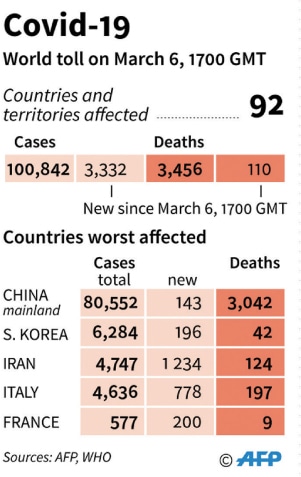
ISLAMABAD: Pakistan’s economy can suffer a maximum of 1.57pc gross domestic product (GDP) losses on account of agriculture, business and trade, tourism and health in case of an outbreak of the novel coronavirus (COVID-19) in the country, according to an assessment by the Asian Development Bank (ADB).
However, the impact of the prevailing outbreak on the country’s economy is estimated between $61m and $16.23m losses depending on how the situation evolves ranging from the worst to the best possible scenario.
The Manila-based lending agency clarified that such an analysis was for illustrative purposes and should not be interpreted as predictions that an outbreak would actually occur. Rather they were meant to guide policymakers in determining how costly an outbreak might be so that they could properly evaluate the benefits and costs of prevention and early response, it explained.
ADB report finds economic impact of disease will help policymakers in evaluating cost, benefits of prevention, early recovery
The ADB said depending on how the outbreak evolved, the magnitude of economic losses in the developing Asian economies would range between $77bn and $347bn or from 0.1pc to 0.4pc of the global GDP.
China alone could face about $103bn of these losses or 0.8pc of its GDP, it estimated.
This significant impact on developing Asia would be through numerous channels, including sharp declines in domestic demand, lower tourism and business travel, trade and production linkages, supply disruptions, and health effects, according to ADB’s “The Economic Impact of the COVID-19 Outbreak on Developing Asia”.
In hypothetically worst scenario of COVID-19 significant outbreak within the country, Pakistan could suffer $4.95bn losses including $1.56bn in the agriculture, mining and quarrying sectors, $1.95bn in business and trade and $1.5bn in manufacturing, transport and hotel services.
In the best case scenario, the impact of prevailing outbreak on Pakistan economy would be limited to $16.23m, including $5.5m on agriculture and quarrying, $5.54m on business, trade and services, $3.6m on manufacturing and about 1.32pc on transport and hotel industry.
In moderate scenario, the total losses on Pakistan are estimated at $34m including $12.2m on agriculture, about $10.7m on business and trade and over $10.8m on hotel, transport and manufacturing.
In the worst case scenario, the estimated losses on the country’s economy are estimated at about $61m. This includes $22m on agriculture and mining, $19m on business and trade and about $18m on other sectors.
The report said that in a moderate scenario, where precautionary behaviours and restrictions such as travel bans start easing three months after the outbreak intensified and restrictions were imposed in late January, global losses could reach $156bn, or 0.2pc of global GDP. China would account for $103 billion of those losses — or 0.8pc of its GDP. The rest of developing Asia would lose $22 billion, or 0.2pc of its GDP.
“There are many uncertainties about COVID-19, including its economic impact,” said ADB chief economist Yasuyuki Sawada. This requires the use of multiple scenarios to provide a clearer picture of potential losses to support governments as they prepare clear and decisive responses to mitigate the human and economic impacts of this outbreak.
The bank said its response to COVID-19 to date included $2m announced on Feb 7 to enhance detection, prevention, and response in the China and Greater Mekong Region, another $2m announced on Feb 26 to support response in all its developing members and $18.6m private sector loan, signed on Feb 25, to Wuhan-based pharmaceutical distributor Jointown Pharmaceutical Group Co Ltd to support the continued supply of essential medicines and personal protective equipment.
It said the bank would be ready to provide further support to its members in their efforts to respond to the adverse impact of COVID-19. To address the identified needs, the ADB would use appropriate means such as existing and new financial assistance, emergency assistance lending, policy-based lending, private sector investment, besides knowledge and technical assistance, it added.
Published in Dawn, March 7th, 2020













































